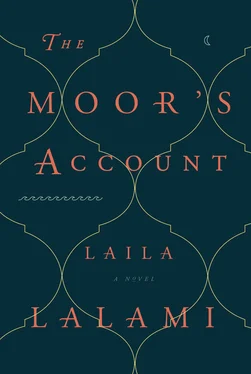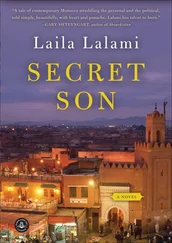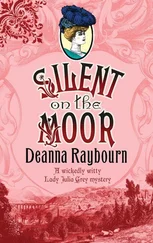At last, Señor Albaniz fell silent. He presented the scroll and waited, head bowed, while Señor Narváez signed his name on the requisition. Facing the crowd, the governor announced that this village would henceforth be known as Portillo. The captains inclined their heads and a soldier raised the standard, a green piece of fabric with a red shield in its center. I was reminded of the moment, many years earlier, when the flag of the Portuguese king was hoisted over the fortress tower in Azemmur. I had been only a young boy then, but I still lived with the humiliation of that day, for it had changed my family’s fate, disrupted our lives, and cast me out of my home. Now, halfway across the world, the scene was repeating itself on a different stage, with different people. So I could not help feeling a sense of dread at what was yet to come.
• • •
MY FEARS WERE CONFIRMED early the next morning, when we heard a commotion behind the village storehouse. Señor Dorantes had wanted me to give him a haircut, and I had just begun to trim the edges of his thick, wheat-colored hair. His beard had grown, too, but he had not asked me to shave it. Perhaps he felt that he did not need to worry about matters of grooming now that he had reached the edge of the empire. Or he grew his beard because he could and the Indians, it was rumored, could not. I confess I did not ask him why; I was relieved to have fewer chores. But when we heard the cries of soldiers, Señor Dorantes shot to his feet, with the white linen cloth still tied around his neck, and ran across the square to see what had happened. I followed him, with the Sevillian scissors still in my hand. The soldiers, it turned out, had found some Indians hiding in the bushes and had captured four of them.
All four were men. All four were naked. I had seen Indians before, on the islands of Cuba and La Española, where the armada had stopped to purchase more supplies, but never at such close range. I was unused to seeing men walk about in their natural state, unashamed of their bodies, so my first impulse was to stare. They were tall and broad-shouldered, with skin the color of earth when it has rained. Their hair was glossy and long, and on their right arms and left legs, they had tattoos in shapes I did not recognize. One of them had a lazy eye, just like my uncle Omar, and he blinked in order to focus his gaze on his captors. Another was surveying the village, taking stock of all that had changed since our arrival: a large cross had been set up by the temple; the governor’s standard hung from a pole in the square; and, along the perimeter, horses were tethered to newly built posts. The stories I had heard about the Indians had me expecting something incredible, fire-breathing jinns perhaps, but these men looked harmless to me — especially next to the Castilian soldiers. Still, they were tied up and brought to Señor Narváez.
From his pocket, the governor retrieved the pebble of gold I had found. Holding it up in his palm, he asked them about it. Where did you find this gold?
The captives looked at him levelly and two of them said something in their mother tongue. I could not detect a pattern yet to the stream of sounds that emerged from their lips — where did one word end and another one begin? My upbringing in a trading town like Azemmur had instilled in me a love of language and, if I may be forgiven for this moment of immodesty, a certain ease with it. So I was curious about the Indians’ tongue, even though it had none of the clues that had been helpful to me when I learned new idioms: familiar sounds, a few words in common, a similar intonation. But, to my surprise, the governor nodded slowly, as if he understood the Indians perfectly and even agreed with them.
Still, he repeated his question. Where did you find this gold?
Behind him, the soldiers watched and waited. Up in the trees, birds were singing, determined in their trills despite the oppressive heat. The soothing sound of waves came from the beach nearby and I could smell smoke in the air — someone had already started a fire for the almuerzo. Again, the Indians answered the governor in the same way as before. At least, I assumed they were answering; it was just as likely that they were asking the governor a question of their own, or challenging him to a fight, or threatening him with death if he did not release them.
The governor listened politely to their answers and then he turned to his page. Lock them up in the storehouse, he said, and bring me a whip.
Señor Dorantes returned to his seat, and again I had to follow. Neither one of us spoke. I finished cutting his hair, handing him a small mirror and holding another one behind him. I saw both of our reflections on these opposing mirrors. My master looked satisfied with the haircut, nodding appreciatively as he turned his face this way and that. His beard nearly hid the scar on his right cheek, a scar, I once heard him proudly tell one of his dinner guests, he had sustained years earlier in Castile, when he had helped put down a rebellion against the king. As for me, my bondage had taught me to keep an impassive face, but in the mirror I noticed that my eyes betrayed my anxiety. I told myself that I had merely been curious about the kind of fishnets the Indians used. I had not been looking for gold. Yet the pebble I had found had caused these four men, men who had done me no harm, to be whipped. I had to pretend, like my master, not to hear the cries that had begun to emerge from the storehouse. Within moments, they had turned into howls, so long and so filled with pain that I felt they were echoing in the depths of my own soul. And then, interrupted by the periodic and terrifying crack of the whip, there was only silence.
Later, when I was helping Señor Dorantes into his boots, I overheard his younger brother, Diego, a quiet lad of sixteen or seventeen years of age, ask him about the governor’s encounter with the Indians. Diego was so different from Señor Dorantes it was a wonder to me that they were blood brothers. Where one was shy and guileless, the other was bold and crafty. Where one was selective in his friendships, the other was quick to love and quick to hate. And yet Diego patterned himself after his older brother in whatever way he could. He wore his doublet unbuttoned at the top and his helmet tilted back, like a weary soldier. He had tried to grow his beard, too, but so far only scattered patches of hair had sprouted on his cheeks. Hermano, Diego said. When did Don Pánfilo learn their language? Has he been to La Florida before?
Señor Dorantes gave Diego an amused look, but he must have thought the question harmless, for he answered it presently. No, this is his first time here, just like us. But he has a lot of experience with the savages. He can make himself understood quite well by them, and he rarely fails to obtain the facts he seeks.
This made no sense to me, yet I remained silent, for I knew that my master would not take kindly to being challenged about the governor’s fluency in the Indian tongue. The elders teach us: a living dog is better than a dead lion.
But why must he whip them? Diego insisted.
Because the Indians are known liars, Señor Dorantes replied. Take these four. They are likely spies, sent here to watch us and report on our movements. Slowly, almost imperceptibly, my master’s tone had shifted from amusement to mild irritation. He stood up and ran a finger along the top edge of his boots, making sure his breeches were properly tucked in. To get the truth, he said, it is necessary to flog them.
THE GOVERNOR HAD WHIPPED the four prisoners until he was satisfied that they had given him the whole truth. Armed with it, he called a gathering of all the officers that evening. They met in the largest lodge in the village, a kind of temple that could have easily accommodated a hundred people, though only a dozen high-ranking men had been invited: the commissary, the treasurer, the tax inspector, the notary, and the captains, among whom was Señor Dorantes. Wooden statues of panthers, their eyes painted yellow and their arms bearing war clubs, had been removed earlier in the day, along with the hand drums that, I imagined, were used in heathen ceremonies. So the temple was bare now. But the ceiling attracted my eye: it was decorated with a multitude of inverted seashells that cast a faint gleam on the ground.
Читать дальше












